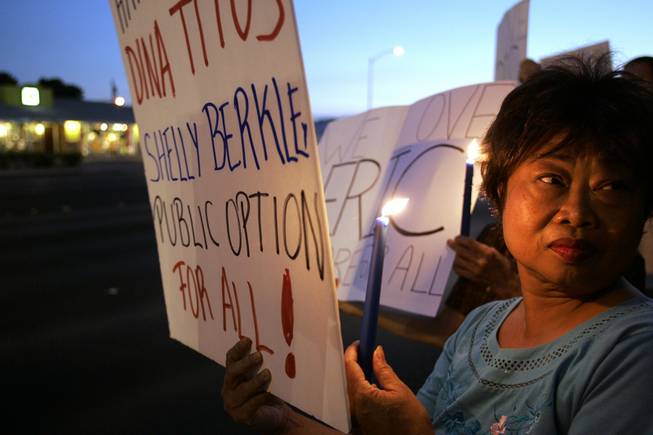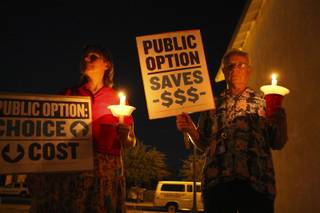
Rose De La Cruz holds up a sign in Las Vegas during a candlelight vigil for health care reform. Her son Eric died in a hospital waiting for a heart transplant.
Sunday, Sept. 6, 2009 | 2 a.m.
Sun Archives
Sun Coverage
Opponents of health care reform have made a brilliant move: Get the media to help you confuse the public, which will stop reform in its tracks.
Here’s how it goes:
Americans would like to know more about the health care debate, with about 45 percent surveyed by the Pew Research Center saying they have been tracking the health-care story closer than any other.
At the same time, they are confused. In a Kaiser Family Foundation poll, half of the respondents said they don’t understand the reform plans being discussed.
And with good reason. Once again, the media have done a stupendous job of confusing people.
Washington Post ombudsman Andrew Alexander reviewed roughly 80 A-section stories on health-care reform published in the Post since July 1. All but about a dozen focused on political maneuvering or protests, he reports. The facts about the proposed legislation played second fiddle.
Anyone who has watched cable television the past six weeks will be familiar with this maddening situation: Airtime for screamers and dramatic showdowns, and almost stunning ignoring of the substance of the issue.
The cable news networks love the visuals of the shouting and finger pointing.
Also, they are cursed with reporters who don’t seem to know anything about the debate. CNBC celebrity anchor Maria Bartiromo asked Rep. Anthony Weiner, D-N.Y., why he’s not on Medicare if it’s such a great government-run insurance program.
Medicare, he politely reminded her, is only for Americans 65 and older.
On the print side, reporters have for too long passed up the opportunity to explain complicated issues such as health care in favor of either: a) he said/she said stories describing a debate in which they give equal credence to all assertions by all sides — true or not; or, b) stories about political tactics wherein they call up operatives on their Rolodex who then speculate — anonymously, of course — on who’s up and who’s down.
The point is, it’s little wonder how totally confused Americans are over the health care debate. The facts are confusing enough just on the face of it. And understanding the issues is impossible when politicos and their demagogic enablers infuse the debate with inflamed rhetoric.
Take two infamous claims, which have been thoroughly debunked.
First, enemies of reform have asserted that a panel of government bureaucrats will ration health care and determine which old or disabled Americans will be euthanized — “death panels,” in the words of former Alaska Gov. Sarah Palin. As the Pulitzer Prize-winning outfit Politifact pointed out, “There is no panel in any version of the health care bills in Congress that judges a person’s ‘level of productivity in society’ to determine whether he or she is ‘worthy’ of health care.”
This fiction seems to have arisen out of another, that doctors would be forced to instruct seniors in ending their lives sooner.
Politifact, again: “The truth is that the health bill allows Medicare, for the first time, to pay for doctor appointments for patients to discuss living wills and other end-of-life issues. These types of appointments are optional, and AARP supports the measure.”
Enemies of reform combined these explosive untruths with ingenious guerrilla tactics, such as the recent visit to Nevada by the lobbyist-backed “Tea Party Express,” to muddy the water.
The media then dropped a paddle in this muddy water and stirred it up some more.
Democrats and other reform backers have failed to effectively educate the public or push back against the media.
Now reform is in trouble, which is not surprising. The public isn’t about to agree to something it doesn’t understand.


Join the Discussion:
Check this out for a full explanation of our conversion to the LiveFyre commenting system and instructions on how to sign up for an account.
Full comments policy